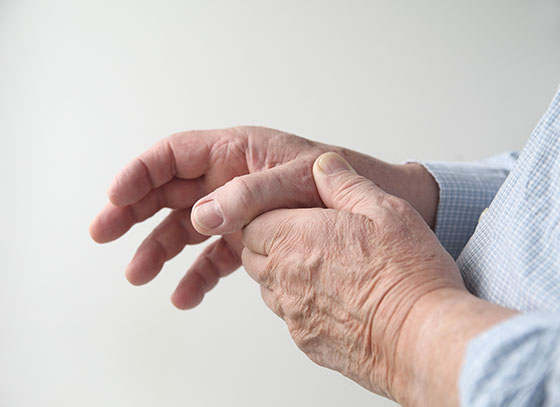
Unless you're Fonzie, Little Jack Horner or a hitch-hiker, you probably don't give your thumbs much thought or notice on any given day. But when they start to ache, as the saying goes, they can stick out like a sore thumb. People with thumb pain quickly realize how often they use their hands. Daily activities can become difficult, even disabling. Turning a door knob, opening a pickle jar, and turning the key in the car ignition are all continual reminders of their problem.
Overuse and rough treatment are the most common causes of thumb pain. In the course of our daily lives, it is extremely easy to bang, jam, twist, pound and otherwise injure our thumbs. Among the most common activities that can make your thumbs throw a temper tantrum:
- Texting or using your cell phone for long periods of time
- Playing lots of video games
- Excessive typing and computer usage
- Using hand tools or operating machinery repetitively
- Sports injuries
In these instances, thumb pain can usually be alleviated by ceasing the activity, as well as getting rest, applying ice and/or compression and taking an over-the-counter pain reliever. But if pain persists -- particularly if accompanied by stiffness, tenderness and swelling -- one has to take into consideration the possibility of a more serious condition such as arthritis.
The most common diagnosis for persistent thumb pain is basal joint arthritis -- the wearing away of cartilage in the joint at the base of the thumb. Due to the fact that the thumb's base joint is such a mobile structure, there is a predisposition to develop severe arthritis here. Interestingly, women with the disorder outnumber men by a ratio of almost ten to one. Furthermore, people with mechanical loading activities, such a massage therapists or manual laborers, have a greater tendency to develop this disorder.
Basal joint arthritis can occur in both hands, typically with one side more severe in symptoms. Common complaints are painful pinch activities (such as clipping nails) and limited breadth of grasp (as in pulling things from a grocery shelf). More advanced instances of basal joint arthritis can lead to a slipping sensation at the thumb base and an enlarging prominence of this area.
A clinical exam of the hand and x-rays, along with the severity of symptoms, will direct the treatment of this disorder. Conservative management is the general approach, as many patients respond well to these measures. Initial treatment for basal joint arthritis is a multi-faceted regimen involving careful coordination between your hand surgeon and hand therapist, as well as a modification of normal activities. Anti-inflammatory medication combined with steroid injections of the thumb joint can alleviate symptoms. These measures are often coupled with thumb splints to protect the thumb and minimize movement that could provoke symptoms. Hand therapists play a vital role by educating the patient on joint protection techniques, work modification principles, and an exercise program focusing on strengthening the muscles around the joint. Together, all these measures can significantly reduce thumb pain and inflammation. With successful improvement of symptoms, the majority of patients can avoid surgery, .
In the patient who fails conservative hand and thumb therapy, surgical intervention is determined by factors such as pain, deformity, weakness that interferes with daily activity, and x-ray changes. Radiological imaging helps guide the treatment approach. In addition, hand dominance and work/leisure activities must also be considered.
Surgical techniques include interposing spacers into the thumb joint, reconstruction of the ligaments around the thumb base with excision of the joint/bone arthritis, and joint fusion. Surgery requires a period of convalescence, allowing for healing and surgical swelling to subside. After two to three months, most patients will have undergone hand therapy and are returning to normal daily hand activities. When symptoms are severe and thumb surgery is elected, most patients have a profound improvement in quality of life and relief of pain.
If you experience thumb pain and discomfort for extended periods of time, don't put up with the symptoms. Get your thumb checked by your family physician, an orthopaedic specialist, a rheumatologist or a hand surgeon. Your medical professional will be able to determine if the pain is due to basal joint arthritis or other causes such as carpal tunnel syndrome, tendinitis, wrist arthritis or rheumatoid (inflammatory) arthritis.
Related Information from Chester County Hospital: